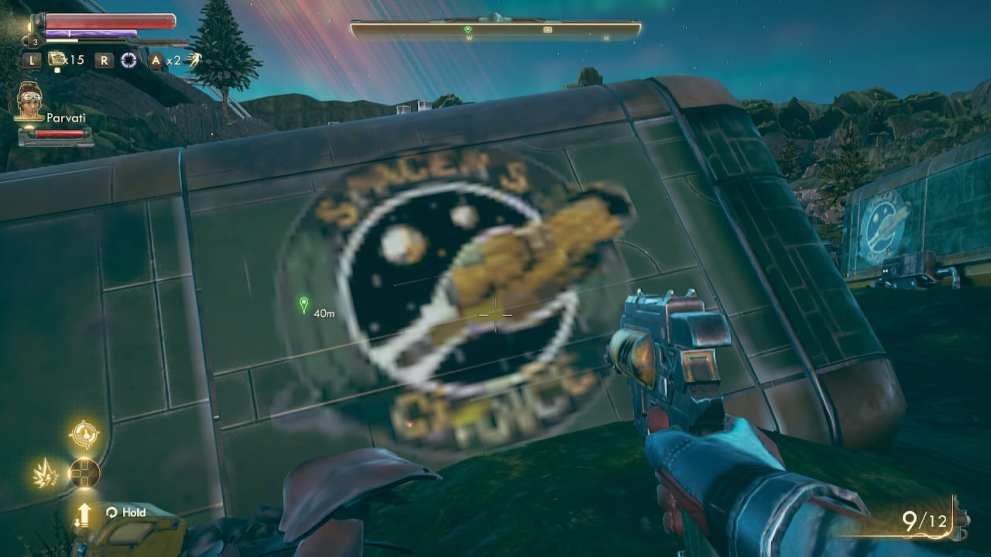Towards the end of last year, Obsidian Entertainment released The Outer Worlds for PC, PS4 and Xbox One. At the time, we knew that the game was also slated to come to Nintendo Switch at a later date. Just the thought of rolling with my pals Pavarti and Vicar Max from planet to planet on the portable system was enough to get me excited. Alas, the end product is pretty difficult to recommend to anyone who can play the game on literally any other platform.
We’ve already reviewed The Outer Worlds on PS4 from when it first released, so rather than retread familiar ground, we’re going to stick strictly to the game’s performance on Switch, how the gameplay translates, and how it controls on a portable, smaller system.
The Outer Worlds’ core gameplay revolves around completing missions for NPCs on different planets, shooting a bunch of enemies, leveling up your character and gear and moving onto the next one. It’s a fun gameplay loop, and it’s more or less Fallout in space. It’s great.
The problem is, for me anyway, the Nintendo Switch has never felt like a good console for playing shooters on. The Joy-Cons’ mini analog sticks feel inaccurate and the triggers and bumpers along the back are too close together making accidental presses of one instead of the other a regular occurrence. In platformers and games that don’t require fast-paced twitchy movements, these can be fairly easily overlooked.
When you’re faced with four enemies shooting you, two of which are charging at you at speed, using the Switch’s controls in handheld mode became more tedious than fun. Shootouts felt stretched out for longer than they should because I couldn’t line the reticle up for the life of me. I hopped on the Xbox One version to make sure it wasn’t just the game’s general handling or me just needing to ‘get gud.’ It wasn’t.

While using the Pro controller does help with the trigger and bumper issues and is generally more comfortable to control, aiming still felt more natural on other platforms. Perhaps the sticks aren’t accurate or sensitive enough.
If traditional control schemes aren’t your thing, you’ll be delighted to know that The Outer Worlds has ‘Motion Aiming’ on the Switch. Players can choose between controlling the camera at all times (or just when aiming down sighs) by moving their Switch, Joy-Con, or Pro controller. As you’d imagine, this certainly doesn’t help aiming or the general control scheme any easier. It’s a gimmick, and not a very well executed one either.
These control issues in and of themselves make The Outer Worlds’ Switch port difficult to recommend. The graphical downgrade and performance issues only further add to the woes.

It’s expected that when a huge current-generation game makes its way to the Switch, there’s going to be some sort of visual or technical downgrade. Perhaps the framerate suffers or the resolution’s scaled right back. The Outer Worlds has fared poorly in this process.
Edges are often jagged, character models look sparsely detailed up-close, and from a distance have blurred faces as the Switch struggles to render the game’s stunning sci-fi landscapes and intricate facial details.
When moving around, the framerate feels noticeably chuggy, dropping frequently, with instances of screen tearing and regular instances of very slow and obvious texture pop-in on buildings and other artifacts in the environment.
A prime example of The Outer Worlds’ Switch port performance issues occurred right towards the beginning of the game as you approach the Unreliable for the first time. As you spot it, you’ll be hollered over by a Lieutenant Mercer and her colleague. In the PS4, Xbox One and PC versions, this looks crisp and clear, and you’re able to make out intricate facial and body details even from afar.

In the Switch version, the whole image looked blurry as if covered by a greasy veil. Imagine the camera had been manhandled by someone who’d just destroyed an entire bucket of fried chicken. It ruins those moments of awe and disbelief you get from simply walking around and exploring the world, uncovering secrets, or just admiring the stars and planets hanging in the skies above.
The only part of the Switch port that does look similar to its platform counterparts are the loading screens, which you’ll have a good 20-30 seconds of to enjoy each time you enter a new settlement or fly to another planet. This, in fairness, isn’t noticeably longer than the PS4 and Xbox One versions, but with the end result being less aesthetically pleasing, it doesn’t quite feel as ‘worth the wait’ as its counterparts.
All of this being said, The Outer Worlds is still a great game. Returning to it on the Switch reminded me how much I actually enjoyed the game. I’m going to play through it all over again, but on my Xbox One.
The Outer Worlds’ Switch port is worth it for those desperate for a semi open-world sci-fi RPG shooter. If you’ve not got a PS4, Xbox One or PC, go ahead and pick the port up so you can at least experience the brilliant galaxy which Obsidian has created. If you have any of those, though, there’s little reason to pick up the Switch port unless you’re absolutely desperate to take it with you on the go. Even then, the shortcomings might be too much of a compromise for some.
